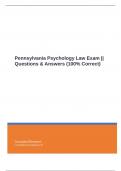Pennsylvania Psychology Law Exam ||
Questions & Answers (100% Correct)
Conceptial Research
conceptialresearch@gmail.com
, Pennsylvania Psychology Law Exam ||
Questions & Answers (100% Correct)
Welfare of Consumer - ANSWER - 1. Acknowledge conflict of interests, fully inform
consumers, freedom of choice in research participation
2. Recognize power in relationships, avoid dual relationships, keep all parties informed
3. Take action if demands of organization beyond reasonable conditions, in leadership
role utilize informed choice, confidentiality, due process, protection from harm
4. Clear financial arrangements, no reward for referrals
5. Terminate relationship if no benefit
Professional Relationships - ANSWER - 1. Act with due regard, benefit of related
professions
2. Do not duplicate services, provide suitable work conditions, consultations,
evaluations
3. Do not exploit relationships, do not engage in sexual harassment
4. Effect change in host organizations, respect sponsoring agencies, principal
contributor first on publications, compiler is chairperson or editor
5. Violations address informally but if threatens welfare of client take to the board
Utilization of Assessment - ANSWER - 1. Examined has rights to receive purpose,
results, interpretations in understandable language, do not impart unnecessary
information, if test sponsored same rights (unless written agreement with all parties)
2. Test accompanied by manual-development, rationale, validity, reliability, how to
interpret
3. Indicate reservations from test circumstances or inappropriateness of test norms
4. Remove obsolete score information
5. Test scoring and interpretation services are to be valid and approrpriate
Research with Human Participants - ANSWER - 1. Will contribute, considered
alternative directions, in compliance with Federal and State regulations, seek ethical
advice, observe safeguards, "subject at minimal risk" (not greater than daily life)
2. If beyond minimal risk, clear and fair agreements, must inform on what could affect
willingness to participate, children or limited ability to consent must have authorization of
guardian, use drugs in facilities with safeguards
3. Deception (justified, consider alternatives, explain as soon as possible), subject can
withdraw, protect from discomfort, harm, danger (if used must be to eliminate greater
harm or great potential benefit-fully informed and voluntary, subject should be able to
contact investigator)
4. Provide participant about nature of study after data collection, remove
misconceptions, investigator must detect/remove/correct undesirable consequences
5. Informed consent is confidential unless agreed upon in advance, if others can obtain
access this is explained to subject




